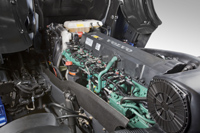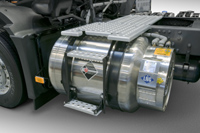Volvo's methane-diesel trucks.
For the first time ever in Europe, it is now possible to use gas-powered trucks for longer and heavier transport applications. Swedish haulage firm Götene Kyltransport is one of the transport companies that for the past year has been testing the new Volvo Trucks model that runs on liquefied methane gas and diesel. Series production starts this summer.
"Our experiences from running on methane-diesel are excellent. This is definitely a solution for the future. If the price of gas is right, I expect that up to 80% of our truck fleet will consist of Volvo's methane-diesel trucks within the next five years," said Ulf Johansson, President of Götene Kyltransport.
This August, Volvo Trucks will be the first manufacturer in Europe to start series production of methane-diesel trucks. Just as the name suggests, the new Volvo FM MethaneDiesel is powered by both methane gas and diesel. Although the model is new, the technology has already undergone exhaustive testing and evaluation. For Götene Kyltransport, which has 140 employees, there was no hesitation about participating in the field tests.
"We always try to do everything as cleanly as possible from the environmental viewpoint. Not least when we're choosing trucks. Thanks to our green focus, we've acquired several new customers who also prioritise the environment when purchasing transportation services," explained Ulf Johansson.
The vehicle tested hauls a 20 metre long refrigerated trailer that can carry three tonnes more than a regular trailer. With this larger capacity trailer, it is the truck's own methane-diesel engine that powers the hydraulic refrigeration unit, rendering unnecessary the two smaller, less eco-optimised diesel engines that otherwise drive the refrigeration units of conventional rigs.
The new Volvo FM MethaneDiesel has a 13-litre engine producing 460 horsepower and 2300 Newton metres of torque. The fuel consists of up to 75% liquefied methane gas and the rest diesel, but this proportion may vary depending on how the vehicle is used. "It's just like driving a regular diesel-powered truck. Of course there's a difference when the time comes for refuelling, but you soon get the hang of it," saed Ulf Olsson, one of the drivers testing the methane-diesel truck at Götene Kyltransport.
Compared with conventional gas-powered engines where the fuel is ignited by spark plugs, the methane-diesel alternative offers 30-40% higher efficiency, which means that fuel consumption is cut by up to 25%.
"The optimal solution is to run on biogas. That cuts carbon dioxide emissions by up to 70% compared with a conventional diesel engine. However, this means that access to biogas must increase," said Mats Franzén, Manager Engine Strategy and Planning at Volvo Trucks.
Thanks to the use of diesel technology combined with liquefied gas power, Volvo's methane-diesel truck can considerably extend its operating range compared with a conventional compressed-gas truck powered by an engine using spark-plug technology. As a result, it is now possible for the first time to use gas-powered trucks for regional transport, with potential for also using them in long-haul operations.
There are considerable benefits with Volvo's new methane-diesel trucks from the purely financial viewpoint too. “They do admittedly require a larger initial investment. However, in most countries truck owners will be able to recoup their investment since the price of methane gas is usually considerably lower than the price of diesel," explained Mats Franzén.
From the purely technical viewpoint there are no major differences compared with a conventional diesel engine. The main difference is in the gas injectors, which are fitted on a plate between the inlet duct and the engine block. In addition there is a thermos-like fuel tank that keeps the gas liquefied at a temperature of -140 degrees C under reasonable pressure. The special catalytic converter with which the truck is equipped is another feature developed particularly for methane gas-powered engines. However, the basic engine itself is a diesel unit and operating reliability with gas power is the same as for diesel. This has been demonstrated not least in the exhaustive field tests that were undertaken.
Independent researchers believe firmly in methane as the fuel of the future for heavy commercial transport operations. "My research indicates that methane gas for next-generation heavy commercial operations offers considerable environmental savings in the form of lower carbon dioxide emissions, and it also allows us to utilise our natural resources in a better way," said Maria Grahn, Fuel Researcher at the Chalmers University of Technology in Göteborg.
One factor that is crucial for the development of methane-diesel trucks is expansion of the gas infrastructure and for the building of more refuelling stations throughout Europe. The gas industry is optimistic about the future and predicts swift expansion.
"Within just five years, all truck owners in Sweden will be able to run on methane gas. In the rest of Europe, there will be ‘blue corridors’ along which it will be possible to refuel with methane gas, making it possible to run on methane gas in most countries," commented Anna Berggren, Head of Market Development at gas distribution company Fordonsgas.
Volvo Trucks started accepting orders for the new Volvo FM MethaneDiesel on May 31. Limited series production will get under way in August. This year Volvo expects to sell 100 methane-diesel trucks in Sweden, Britain and the Netherlands, the markets that offer the best availability of liquefied gas. In 2012 the company expects to increase production to 400 trucks and expand sales to additional markets.
Link to film: http://www.youtube.com/watch?v=YZFNY1R-T-s.



Left to right: Engine installation, LNG gas tank, dashboard